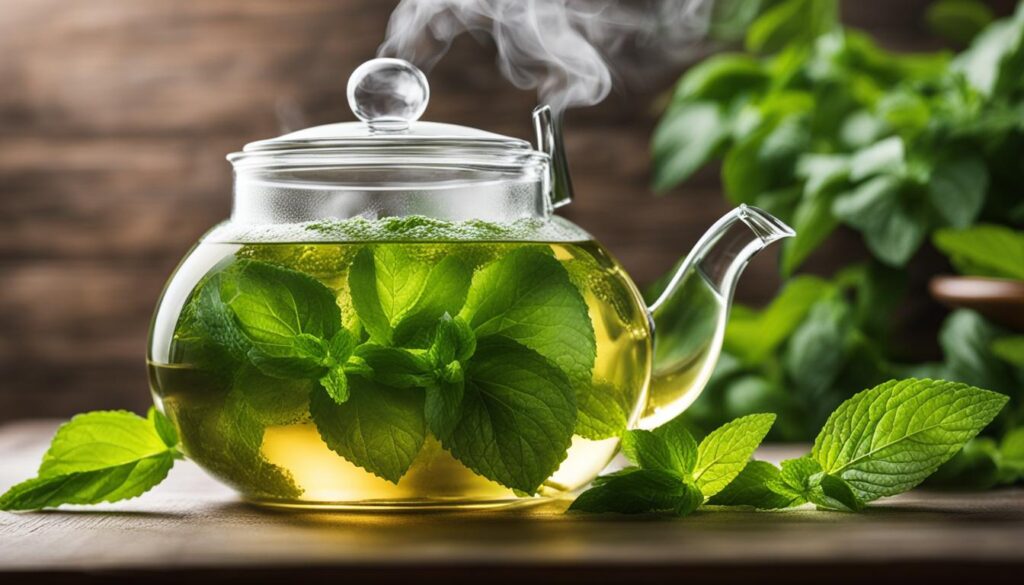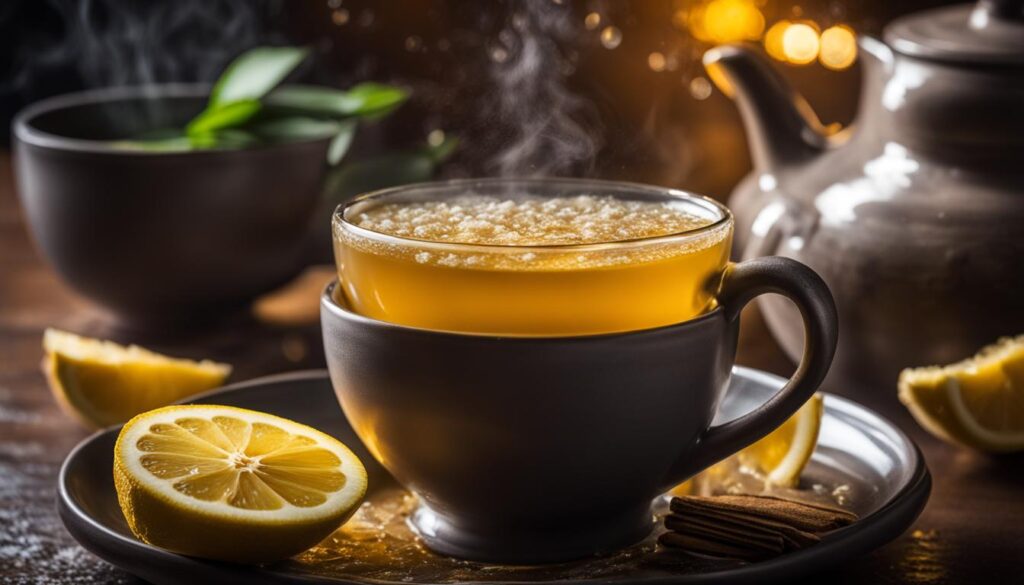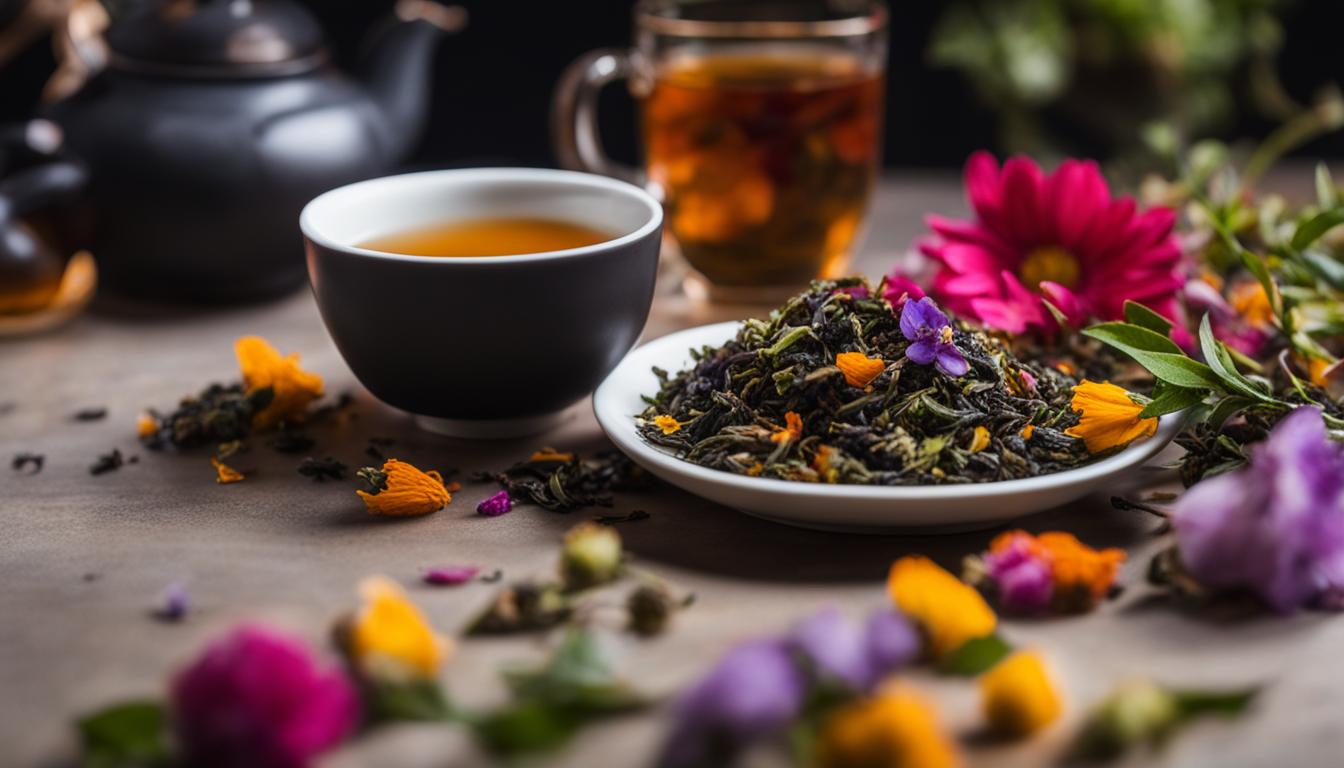When it comes to finding relief for digestive issues and promoting gut health, herbal teas can be a soothing remedy. Whether you’re struggling with indigestion, bloating, or nausea, these natural infusions offer a gentle and effective solution. From peppermint to ginger, fennel to dandelion root, there are numerous herbal teas that have been cherished for centuries for their digestive benefits.
Our team has curated a list of seven of the best herbal teas for promoting digestion and gut health. These teas have a long history of use and are known to provide relief for abdominal pain, relax the intestines, reduce inflammation, and improve beneficial gut bacteria. Incorporating them into your daily routine can help you find comfort and support for a healthy gut.
Key Takeaways:
- Herbal teas offer natural support for a healthy gut and can alleviate symptoms such as indigestion, bloating, and nausea.
- Peppermint tea contains menthol, which helps reduce abdominal pain and is beneficial for irritable bowel syndrome (IBS).
- Ginger tea stimulates stomach contractions and emptying, making it effective for nausea, cramping, and bloating.
- Fennel tea has anti-inflammatory and antimicrobial properties, promoting gut balance and reducing symptoms of IBS.
- Dandelion root tea aids digestion, fights inflammation, relieves water retention, and supports liver health.
By exploring the world of herbal teas, you can discover the calming and comforting effects they have on your digestion. Soothe your gut and embrace the therapeutic benefits they offer!
Peppermint Tea: A Refreshing Remedy for Digestive Health
When it comes to finding a natural remedy for indigestion and abdominal pain, look no further than peppermint tea. This refreshing herbal infusion has been used for centuries to soothe digestive discomfort and promote gut health.
One of the key compounds found in peppermint tea is menthol, which has been shown to have a calming effect on the muscles of the gastrointestinal tract. This can help reduce abdominal pain and alleviate symptoms associated with irritable bowel syndrome (IBS). So the next time you’re experiencing indigestion or bloating, reach for a cup of peppermint tea to find relief.
Peppermint tea is not only beneficial for digestion, but it also has a cooling and refreshing taste that makes it a popular choice for hot summer days. You can enjoy it hot or cold, and even combine it with other herbs like raspberry leaves to create a delicious and soothing blend. So why not try incorporating peppermint tea into your daily routine and experience the digestive health benefits for yourself?

The Benefits of Peppermint Tea for Digestive Health
- Relieves abdominal pain and discomfort
- Reduces symptoms of irritable bowel syndrome (IBS)
- Soothes indigestion and bloating
- Calms the muscles of the gastrointestinal tract
- Refreshing and cooling taste
“Peppermint tea has been a game-changer for my digestion. It’s soothing, refreshing, and provides immediate relief from abdominal pain.” – Sarah, Peppermint Tea Enthusiast
| Peppermint Tea | Herbal Tea for Indigestion | Tea for Abdominal Pain |
|---|---|---|
| Natural remedy for digestive discomfort | Alleviates symptoms of indigestion and bloating | Calms muscles of the gastrointestinal tract |
| Contains menthol for pain relief | Reduces symptoms of irritable bowel syndrome (IBS) | Soothing and refreshing taste |
| Can be enjoyed hot or cold | Combines well with other herbs like raspberry leaves | Provides immediate relief from abdominal pain |
Ginger Tea: A Holistic Aid for Digestion
Ginger tea is a delightful and effective herbal remedy for a variety of digestive issues. Its natural properties make it a popular choice for those seeking relief from bloating and stomach upset. The soothing warmth of ginger tea can help ease discomfort and promote a healthy digestive system.

One of the key benefits of ginger tea is its ability to alleviate bloating. It can help relax the muscles of the gastrointestinal tract, reducing gas and bloating. Ginger also has anti-inflammatory properties that can help soothe inflammation in the digestive system.
Additionally, ginger tea is known for its ability to ease stomach upset. Whether you’re experiencing nausea, indigestion, or motion sickness, a warm cup of ginger tea can provide relief. Ginger has been used for centuries in traditional medicine to calm the stomach and promote healthy digestion.
“Ginger tea is a soothing and holistic herbal remedy for bloating and stomach upset. With its anti-inflammatory properties and ability to relax the muscles of the gastrointestinal tract, it offers natural relief for digestive discomfort,” says Dr. Emily Thompson, a renowned herbalist.
Ginger Tea: Tips for Preparation
To prepare a cup of ginger tea, follow these simple steps:
- Peel and slice fresh ginger root.
- Add the ginger slices to a pot of boiling water.
- Simmer for about 10-15 minutes.
- Strain the ginger slices from the tea.
- Add honey or lemon for added flavor, if desired.
Enjoy your ginger tea warm and savor the comforting and beneficial effects it has on your digestion.
| Ginger Tea Benefits | Ginger Tea Precautions |
|---|---|
|
|
Fennel Tea: Soothing Digestion and Balancing the Gut
Fennel tea is a popular herbal remedy for digestive complaints and offers soothing benefits for the gut. This aromatic tea is known for its calming properties and ability to relieve various digestive issues, making it an excellent choice for individuals with irritable bowel syndrome (IBS) or other digestive disorders.
The key to fennel tea’s digestive benefits lies in its anti-inflammatory and antimicrobial properties. These properties help reduce inflammation in the gut and combat harmful bacteria that can cause digestive problems like diarrhea, bloating, and indigestion.
Furthermore, fennel tea has been found to alleviate symptoms of IBS, including abdominal pain. It works by relaxing the muscles in the intestines, which can help reduce cramping and discomfort. Incorporating fennel tea into your daily routine may offer relief from digestive complaints and promote a healthy gut.
How to Prepare Fennel Tea
- Start by boiling water in a kettle or pot.
- Add 1 teaspoon of fennel seeds to a tea infuser or tea pot.
- Pour the boiling water over the fennel seeds.
- Allow the tea to steep for 5-10 minutes.
- Strain the tea into a cup, and it’s ready to be enjoyed.
For added flavor and digestive benefits, you can also consider combining fennel tea with other digestive herbs like peppermint or ginger. This blend will not only provide a pleasing taste but also enhance the tea’s overall effectiveness in soothing digestion.
Remember, if you have any underlying health conditions or are taking medications, it’s always a good idea to consult with your healthcare provider before incorporating fennel tea or any other herbal remedies into your routine.
Dandelion Root Tea: Supporting Digestion and Detoxification
Dandelion root tea is a powerful herbal tea that offers numerous benefits for digestion and liver health. Its natural properties make it an excellent choice for relieving bloating and supporting overall gut health. Dandelion root is rich in antioxidants, vitamins, and minerals, making it a popular choice for herbal tea enthusiasts.
One of the key benefits of dandelion root tea is its ability to aid digestion. It stimulates the production of digestive juices, which helps break down food and promote efficient nutrient absorption. This can alleviate symptoms of bloating and indigestion, providing relief and improving overall comfort after meals.
In addition to its digestive benefits, dandelion root tea is also known for its detoxifying properties. It supports liver function by promoting the elimination of toxins and waste products from the body. This makes it a valuable addition to any cleanse or detox regimen. Regular consumption of dandelion root tea can help improve liver health and enhance overall well-being.

The Health Benefits of Dandelion Root Tea:
- Relieves bloating and promotes digestion
- Supports liver function and detoxification
- Rich in antioxidants, vitamins, and minerals
- May aid in weight loss by promoting satiety
- Provides natural diuretic properties, reducing water retention
To enjoy the benefits of dandelion root tea, steep a teaspoon of dried dandelion root in a cup of hot water for 10-15 minutes. Strain and enjoy it hot or chilled. You can also find dandelion root tea blends that combine it with other herbs for added flavor and benefits.
| Herbal Tea | Benefits |
|---|---|
| Peppermint Tea | Relieves indigestion and abdominal pain |
| Ginger Tea | Soothes bloating and stomach upset |
| Fennel Tea | Supports digestion and balances the gut |
| Dandelion Root Tea | Supports digestion and detoxification |
Incorporating dandelion root tea into your daily routine can provide a natural and gentle way to support your digestive system and promote overall gut health. Try adding it to your tea collection and discover the soothing benefits it offers.
Conclusion
As we wrap up our exploration of digestive health teas, it’s clear that these herbal infusions are a true gift for our gut. Whether you’re dealing with indigestion, bloating, or nausea, incorporating these teas into your daily routine can provide soothing relief and support overall gut health.
From the refreshing remedy of peppermint tea to the holistic aid of ginger tea, each herbal infusion offers unique therapeutic benefits. Fennel tea helps balance the gut, dandelion root supports digestion and detoxification, and artichoke, liquorice, and turmeric bring their own healing properties to the table.
So why not elevate your tea time and give your digestive system the love it deserves? Experiment with different blends, find your favorites, and enjoy the calming and comforting effects of herbal teas on your digestion. Remember, when it comes to digestive health, the power is in your cup!
FAQ
Can herbal teas really help with digestion and gut health?
Yes, herbal teas have been used for centuries to alleviate symptoms like indigestion, bloating, and nausea. They contain compounds that can help relieve abdominal pain, relax the intestines, reduce inflammation, and improve beneficial gut bacteria.
Which herbal teas are best for promoting digestion and gut health?
Some of the best herbal teas for promoting digestion and gut health include peppermint, ginger, fennel, dandelion root, artichoke, liquorice, and turmeric. These teas have soothing and therapeutic benefits for the digestive system.
What makes peppermint tea beneficial for digestion?
Peppermint tea contains menthol, which helps reduce abdominal pain and symptoms associated with irritable bowel syndrome (IBS). It also relaxes the oesophagus and intestine, preventing indigestion and nausea.
How does ginger tea support gut health?
Ginger tea stimulates stomach contractions and emptying, making it beneficial for nausea, cramping, bloating, and indigestion. It is particularly effective for relieving nausea during pregnancy and motion sickness.
What are the benefits of fennel tea for digestion?
Fennel tea has anti-inflammatory and antimicrobial properties, which can restore gut balance and promote healthy digestion. It helps combat harmful bacteria that cause digestive issues like diarrhea and indigestion.
How does dandelion root tea support digestion and detoxification?
Dandelion root tea promotes healthy digestion by aiding food movement in the digestive tract and fighting inflammation. It also acts as a diuretic, relieving water retention and bloating. Additionally, it supports kidney function and helps the liver remove toxins.
Are there other herbal teas that can support digestion and gut health?
Yes, there are many other herbal teas that offer soothing and therapeutic benefits for the digestive system. Some examples include artichoke, liquorice, and turmeric. Experiment with different blends to find what works best for you.





